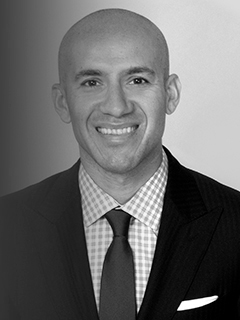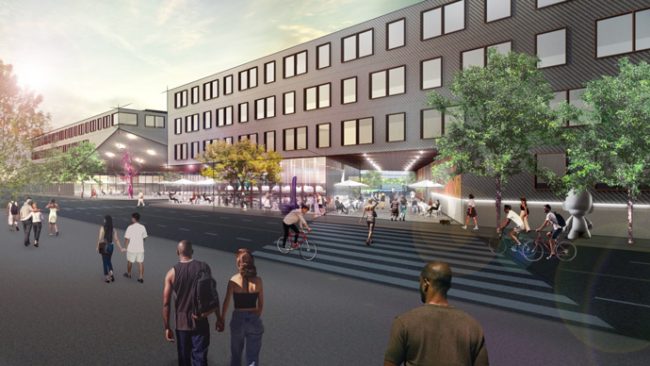About three dozen Chicago real estate bigwigs and other business leaders gathered at the Soho House in Fulton Market last month to talk about the political vise that seemed to be closing in around them.
Already high property taxes had nowhere to go but up, affordable housing requirements were tightening landlords’ profit margins, and the sudden changes at City Hall didn’t bode well for either issue.
Then Byron Sigcho-Lopez walked into the member’s-only club and took a seat in the front row.
The long-time affordable housing activist had declared victory weeks earlier in a five-way open race for alderman of Chicago’s rapidly-changing 25th Ward. And Sigcho-Lopez, who took office Monday, was one of six Democratic Socialists headed to the 50-member City Council — the biggest shift to the left it’s seen in more than a century.
His repeated confrontations with the real estate industry were a central plank in his campaign. In speech after speech, he pledged to shirk donations from major developers whom he had called “greedy” and blamed for pricing longtime residents out of Pilsen.

Century 21 broker Armando Chacon
“It felt so uncomfortable at first, introducing him to [people] who were at the total opposite end of the spectrum,” said Armando Chacon, president of the West Central Association neighborhood group and a Century 21 broker, who hosted the Soho House event and invited Sigcho-Lopez. “But then, I thought, ‘This is good. This is exactly what we need.’”
So, over cocktails, developers and brokers took turns introducing themselves to Sigcho-Lopez, who calmly listened to their pitches on public-private partnerships and the needs of institutional investors without explicitly agreeing, several people who attended told The Real Deal. It was one of a few recent interactions that have provided some comfort to real estate professionals since they watched the former head of the Pilsen Alliance neighborhood group win the race on April 2.
For at least five years, the Ecuador native has been an insurgent fixture in local housing and education politics. Anyone at a public meeting in the neighborhood could expect to hear his raspy, accented voice ringing out from the back of the room, demanding answers from those in power.
It felt so uncomfortable at first, introducing him to people who were at the total opposite end of the spectrum.
Now that he’s one of those authority figures, Sigcho-Lopez will sit up front, charged with balancing the interests of a complex web of stakeholders. He will be held partly responsible for the future of an eight-acre vacant lot that’s been a perennial lightning rod for controversy and the subject of a lawsuit over the previous alderman’s push to block a proposed rental complex. Perhaps most importantly, he’ll play a key role in shaping the first phases of Related Midwest’s $7 billion plan for The 78, its 62-acre megaproject along the Chicago River, on the far east edge of his ward.
“I haven’t agreed with a lot of his positions, but I can honestly say I’ve been encouraged by what I’ve heard from him,” Chacon said about the alderman’s sudden push to bring everyone to the table. “I think he’s going to be very open-minded.”
But much of that depends on how heavily Sigcho-Lopez leans on Chicago’s “aldermanic privilege” — the unwritten rule that traditionally gives local officials near-total power over their wards. So far, he has sent mixed signals on the controversial norm, opposing it in principle while vowing to wrest local control over any new development proposal.
Still, the alderman could find himself “backed into a corner” with no choice but to embrace the kinds of ribbon-cutting photo ops that tend to get candidates re-elected, said Troy Hernandez, a long-time critic of Sigcho-Lopez who ran against him for alderman this year.
The new alderman “has two choices: become a four-year lame duck, or support development,” Hernandez told TRD in an email. “The coalition that gets you into office isn’t the coalition that keeps you in office.”
A changed Pilsen
Sigcho-Lopez ran his campaign out of an office that he shared with a car insurance company on the first floor of a two-story house on Blue Island Avenue. The walls inside are still covered in campaign materials, including a poster drawn up by young volunteers with the words “real estate lobby” circled and crossed out.
Sigcho-Lopez had never been to Pilsen before 2001, the year he emigrated alone from Quito, Ecuador at age 17. Five years later, after graduating from Cumberland University in Tennessee with a degree in math and business administration, he moved back to Chicago in search of “any job I could get,” he said. The young activist then moved to Pilsen eight years ago and has lived there since.
“You had a very different community then,” Sigcho-Lopez said. “Safety was obviously much more of a concern, but you had a lot of small businesses that are no longer here.”
The neighborhood started to change fast in 2012, after a group of nightclub owners opened a new bar and event space inside Thalia Hall, a historic Romanesque building on 18th Street. Suddenly, Pilsen was on the map for the city’s Downtown crowd, and real estate money followed.
“At that point, I don’t know if anybody could have imagined that this kind of development would be coming this fast,” Sigcho-Lopez said. “Now, you drive down 18th Street between Halsted and Ashland, and you see more and more high-end restaurants.”
Those changes have had a stark impact on home values. The median sale price for homes in Pilsen more than tripled from $100,000 in 2012 to $356,000 this spring, hopscotching the citywide median in 2017, according to Redfin.
Every step of the way, Sigcho-Lopez and the Pilsen Alliance were pushing to pump the brakes on luxury development and slow a process they saw as responsible for uprooting poor families. Last year, members of the alliance linked arms to block attendees who had bought $99 tickets to a Bisnow event called “Chicago’s Emerging Neighborhoods,” with one group leader saying it the represented “predatory” development patterns.
By then, Sigcho-Lopez had stepped down from the group to run for alderman. But the protest was indicative of the activist group’s penchant for “chasing out anyone who’s tried to add value to the neighborhood,” said Redfin broker Niko Voutsinas, who represents homebuyers in Pilsen and who lived in the neighborhood from 2010 to 2018.
After the 2016 election, Sigcho-Lopez found that the surging Democratic Socialists of America shared his views on housing, especially on rent control, which he had long advocated. So it wasn’t long before he joined the pack.
Among the other DSA members who took office Monday were Aldermen Daniel La Spata and Andre Vasquez, who pulled off longshot upsets against deeply-entrenched incumbents. And all six leftist aldermen represent wards with gentrifying or well-to-do neighborhoods — from Albany Park on the North Side to Woodlawn on the South Side.
The Chicago Association of Realtors, whose influential political arm is working on overdrive to keep rent control illegal, cut a late check to Sigcho-Lopez’s opponent before the runoff.
Two months later, many in the industry remain suspicious, even after the alderman’s outreach campaign.
“I’ve spoken to [real estate brokers] who say, ‘He’s a politician, he’ll become pragmatic,’” said Voutsinas, who added that he never personally met Sigcho-Lopez. “I don’t know if that’s true. His roots are pretty deep in Pilsen Alliance.”
Learning the ropes

Former Alderman Danny Solis
Across the street from Sigcho-Lopez’s Blue Island campaign office, the ward office for outgoing Alderman Danny Solis — who had been in office for 24 years — was darkened and locked on a recent Friday afternoon. The City Council veteran and former chairman of its Zoning Committee disappeared from City Hall in the wake of a January report that implicated him in a vast corruption scheme.
Solis, 69, came under investigation for accepting Viagra pills and massage parlor visits as bribes, among a litany of other accusations. And like the rest of his constituents, Sigcho-Lopez had no idea about Solis’ whereabouts a month after the runoff election.
The incoming alderman has still not spoken a word with his predecessor, not even for a quick congratulatory phone call, and has only had sparse contact with Solis’ staff since the election, he said. That included a “courtesy lunch” with his predecessor’s former chief of staff, Francisco Lassio, and a lesson on how to renew a contract for the office copy machine. But Sigcho-Lopez said he got “no documentation” on license applications or development proposals.
While the rough transition left the new alderman to learn the ropes of city government on his own, it also gave him carte blanche to create an office that would be more “democratic” than his predecessor’s, he said.
“I’m doing the same thing I did as a candidate, and the same thing I did for 10 years as an organizer,” Sigcho-Lopez said. “We’re trying to reach out and hear ideas and proposals from people who may not have had access to their alderman in the past.”
But it also leaves him holding the bag for some of Solis’ lingering controversies, like the ongoing lawsuit over the eight-acre vacant lot at 16th Street and Sangamon Avenue. As part of a failed 2006 proposal by former HUD Secretary Henry Cisneros to build nearly 400 condos and townhomes on the site, Solis drafted a community agreement setting a minimum of 21 percent on-site affordable housing for any new residential development in the neighborhood.

Renderings of Property Markets Group’s “Parkworks” proposal
Then in 2016, after New York-based Property Markets Group proposed a 465-unit rental and retail complex on the site, Solis rezoned it as an industrial location to block any construction. The former alderman told DNAinfo at the time he wanted to “make sure that we do something exceptional there.” The developer sued the city last year, calling the rezoning illegal, and the case remains tangled up in court.
Last summer, city officials recruited the D.C.-based Urban Land Institute to offer a proposal to break the stalemate. They presented their plan at a public meeting in August, which Sigcho-Lopez and his Pilsen Alliance comrades attended. The would-be alderman had led multiple protests against PMG, which he called a “greedy developer.”
But zoning attorney Rolando Acosta said Solis’ 21 percent rule effectively halted “any kind of development to which it applied.” Others in the real estate business have echoed his criticism.
“It demanded such a big piece of the pie that there was no pie to begin with,” because it made projects too difficult to finance, Acosta said. The resulting lack of housing supply may have only made the neighborhood’s affordable housing crisis worse, he added.
Now developers are lashing out at Sigcho-Lopez’s promise to raise the affordability threshold even higher — to 30 percent for all new developments in Pilsen. At a real estate forum last week, Belgravia Group Chairman Alan Lev predicted that would generate affordable units in “30 percent of zero” new developments.
The new alderman and his allies have pointed to Bickerdike Development’s all-affordable proposal for new apartments in Logan Square as a sign that such projects are feasible. “There are other proposals that need to be considered,” Sigcho-Lopez said. “So why is a New York developer even buying this lot, and imposing its plan on a community that’s overwhelmingly said it already wants 21 percent?”

Property Markets Group principal Noah Gottlieb
PMG’s Chicago Principal Noah Gottlieb said that if his firm pulls out, residents shouldn’t hold their breath for a better proposal to come along to fill the massive space.
Solis “treated affordable housing and the well-being of his constituents like it was a game of chicken, hoping that developers would blink and just agree to the 21 percent policy,” he wrote in an email. “For the past 15 years, that gamble created zero … units of affordable housing in Pilsen as part of private developments.”
“Our hope is that Byron appreciates that a solution to Pilsen’s affordable housing challenges requires a balanced and creative approach, not a hard line drawn around a percentage,” Gottlieb added.
Making his mark
In April, the incoming alderman held a public meeting in the South Loop so local residents could ask representatives of Related Midwest and Chicago’s architecture firm Skidmore, Owings & Merrill about their plans for The 78, which calls for up to 13 million square feet of new housing, office and hotel space.
Mayor Rahm Emanuel had just ushered through a round of sweeping approvals for the 62-acre proposal through the City Council, over the loud objections of Sigcho-Lopez and other activists.
As the developers and their partners plan the first stages of the megaproject, the forum marked the first step in Sigcho-Lopez’s vow to bring “transparency” to the proposal, which he said still demands “a lot of questions.”
“We’re still trying to get details,” he said. “If it’s getting [tax increment financing], how is it actually going to benefit the community?”
A spokesperson for Related Midwest said in a statement planning for the project has remained open, including multiple “meetings with neighbors, community organizations and small business owners for over two years” on everything from affordable housing and public space to job training and contracting. “We look forward to continuing our work with the aldermen and neighboring communities,” the spokesperson added.
The power to control zoning may be the strongest leverage Sigcho-Lopez has to influence the proposal, but he has not come out swinging against any specific details of the proposal.
The former activist told the Chicago Sun-Times this year he agrees with Mayor Lori Lightfoot’s opposition to “aldermanic privilege.” But earlier this month, he walked back that position, saying “ultimately, decisions are going to have to be on the local level” for large-scale development proposals like The 78.
“I would not want to see Downtown making those decisions on the residents’ behalf,” Sigcho-Lopez told TRD.
And while the project may have gotten its first major zoning approval from the mayor, it will likely need many more during the next four years, said Alderman Gilbert Villegas (36th), chairman of the City Council Latino Caucus. On everything from building proposals to water main repairs, Sigcho-Lopez will be expected to have a seat at the table.
There are a whole lot of things that have not been finalized yet, that are going to allow Byron to get some wins for his community.
“There are a whole lot of things that have not been finalized yet, that are going to allow Byron to get some wins for his community,” Villegas said. “There’s always going to be some degree of support that the developer needs from the city, so it’s going to be important for Byron to have that ability to chime in.”
